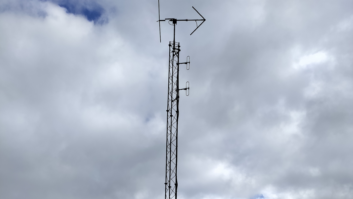
A special flag begins its trip to the top.
Our Workbench column about electrical service panels titled “This Box Could Kill You” reminded Frank McLemore of a safety tip he was taught while working a college summer job at a steel mill.
The rule at the mill was: “Always operate the switch with your left hand.” Can you guess why? I’ll answer later in this article.
****
In honor of Independence Day I share a picture from James Keightley, who provides small-market broadcast engineering services.
James raises a flag when he supervises the erection of a broadcast tower. This flag is special to James; it’s a 48-star banner that once draped the casket of his late father, a U.S. Army veteran.
James has constructed nine sites in the last few years. When a final tower section goes up, his dad’s flag rides along. It flies as long as the tower workers — Broadcast Tower Services of Portland — are aloft; and when the project is complete, they bring it back to him.
During a job in Arlington, Wash., the rigger who returned the flag to James was a vet. While aloft he used the breeze to assist him in a military fold of the flag; he then placed the flag inside his shirt and climbed down. As he approached James, he took the flag from his shirt, held it military style, extended it to James and said, “In memory of Cpl. William Smith Keightley, United States Army, Corps of Transportation, World War One.”
As you might imagine, James broke down.
The rigger must have done some heavy-duty Internet research to have come up with that unexpected information; and it was entirely correct.
****
Buc Fitch tells us that Marlin P. Jones Associates is at it again with their latest offering in digital meters. This is the cheapest AC power meter Buc has encountered, useful for small sub-tenants.

James Keightley honors his father by flying a 48-star American flag at the tower sites where he works.
You probably have a small tenant or two at your transmitter site — perhaps the local pager or cab company, or two-way user — whose AC power consumption should be separately metered. This panel meter costs about a tenth the price of an Osaki mechanical wattmeter, which go for close to $200.
The MPJA flexible snap-in panel meter can measure 120 or 240 volts, at flows of up to 20 amps. In addition to measuring AC Volts and current, the meter measures watts, watt-hour and operational time (run time). On the website www.mpja.com, search for item 31367 ME. It was $15.95 when we looked.
****
Knowing my love of useful gadgets, Adams Radio Group’s Las Cruces CE, Roger Moyer, displays the Z-Creeper in Fig. 2.
This 40-inch mechanic’s creeper can be folded into a “Z” shape to provide a wheeled low-rise seat, ideal for working on transmitters or under the console. If needed, the seat can be unfolded for use as a standard mechanic’s creeper, Fig. 3. The 3/4-inch powder coated frame is designed to carry a 300-pound load and costs less than $70 on centurytool.net.
Thanks, Roger, for sparing our backs — and our rear-ends.
****
Why did grizzled supervisors at Frank McLemore’s steel mill insist on a left-handed approach to a utility panel?


The Z Creeper saves your back, and your bottom, when working on equipment The Z Creeper also unfolds into a comfortable mechanics creeper
The mill had had a fatal accident prior in which a worker pulled the lever to the “off” position, and there was an arc that exploded the foundry dust inside the box. The switch cover/door was blown off, striking the person in the head and killing him.
When you face your switch, the control lever is on the right side of the box; by using your left hand when you actuate the switch, you force yourself to stand to the side rather than directly in front. Not a bad idea to ensure your safety.
Frank McLemore was a contract engineer in the Columbus, Ga., area and now handles the ABIP Alternate Inspections for the state of Georgia.
****
Massachusetts-based consultant Lew Collins also wrote in about that May 21 power box column. Lew questioned why the fuses did not limit the current as they were supposed to do. We put our faith in the over-current protective device, whether it be a fuse or a circuit breaker. In this case, something went wrong. Lew speculates that the real problem was the age of the device in question.
Contribute to Workbench. You’ll help your fellow engineers and qualify for SBE recertification credit. Send Workbench tips to[email protected]. Fax to (603) 472-4944.
Author John Bisset has spent 44 years in the broadcasting industry and is still learning. He handles West Coast sales for the Telos Alliance. He is SBE certified and is a past recipient of the SBE’s Educator of the Year Award.












